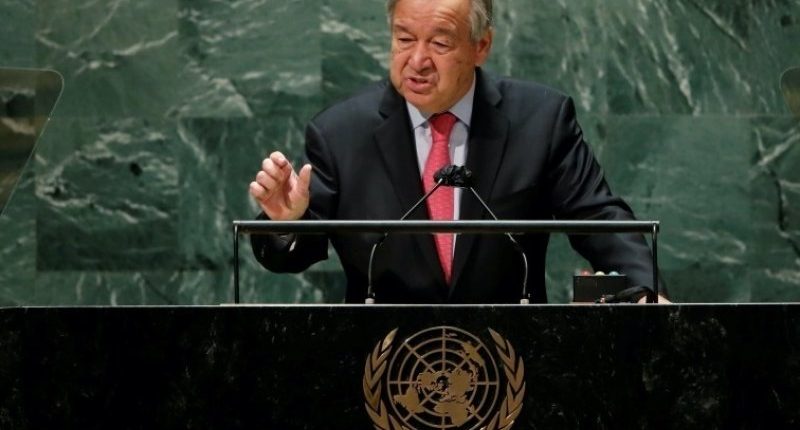Mr. António Guterres, the United Nations (UN) Secretary-General, has called for bridging the gap between the rich and the poor, within and among countries.
This, he said, starts by ending the COVID-19 pandemic for everyone, everywhere.
“We urgently need a global vaccination plan to at least double vaccine production and ensure that vaccines reach 70 percent of the world’s population in the first half of 2022,” Mr. Guterres stated in his address on Tuesday to the UN General Assembly.
He said this plan could be implemented by an emergency Task Force made up of present and potential vaccine producers, the World Health Organization, Access to COVID-19 Tools (ACT) – Accelerator partners, and international financial institutions, working with pharmaceutical companies.
“We have no time to lose. A lopsided recovery is deepening inequalities. Richer countries could reach pre-pandemic growth rates by the end of this year, while the impacts may last for years in low-income countries,” he said.
“Is it any wonder? Advanced economies are investing nearly 28 percent of their Gross Domestic Product (GDP) into economic recovery. For middle-income countries, that number falls to 6.5 percent.”
He noted that it plummets to 1.8 percent for the least developed countries — a tiny percentage of a much smaller amount.
The Secretary-General said in Sub-Saharan Africa, the International Monetary Fund projects that cumulative economic growth per capita over the next five years would be 75 percent less than the rest of the world; adding that many countries need an urgent injection of liquidity.
“I welcome the issuance of $650 billion in Special Drawing Rights (SDRs) by the International Monetary Fund. But these SDRs are largely going to the countries that need them least,” he said.
“Advanced economies should reallocate their surplus SDRs to countries in need. SDRs are not a silver bullet. But they provide space for sustainable recovery and growth.”
Mr. Guterres also renewed his call for a reformed and more equitable international debt architecture.
He said the Debt Service Suspension Initiative must be extended to 2022 and should be available to all highly indebted vulnerable and middle-income countries that request it; saying “This would be solidarity in action”.
The Secretary-General said countries shouldn’t have to choose between servicing debt and serving people.
He said with effective international solidarity, it would be possible at the national level to forge a new social contract that includes universal health coverage and income protection, housing and decent work, quality education for all, and an end to discrimination and violence against women and girls.
“I call on countries to reform their tax systems and finally end tax evasion, money laundering, and illicit financial flows,” he stated.
“And as we look ahead, we need a better system of prevention and preparedness for all major global risks.
“We must support the recommendations of the Independent Panel for Pandemic Preparedness and Response.”
He reiterated that he had put forward a number of other proposals in their Common Agenda — including an emergency platform and a Futures Lab.
Mr. Guterres, who also called for bridging the gender divide, said COVID-19 exposed and amplified the world’s most enduring injustice: the power imbalance between men and women.
“When the pandemic hit, women were the majority of frontline workers, first to lose their jobs, and first to put their careers on hold to care for those close to them,” he said.
“Girls were disproportionately hit by school closures that limit their development and increase the risk of abuse, violence and child marriage.”
He said bridging the gender divide was not only a matter of justice for women and girls; saying “it is a game-changer for humanity”.
He said societies with more equal representation were more stable and peaceful, and that they had better health systems and more vibrant economies.
“Women’s equality is essentially a question of power. We must urgently transform our male-dominated world and shift the balance of power, to solve the most challenging problems of our age,” he said.
He maintained that that means more women leaders in parliaments, cabinets, and board rooms; “it means women fully represented and making their full contribution, everywhere”.
He urged governments, corporations, and other institutions to take bold steps, including benchmarks and quotas, to create gender parity from the leadership down.





